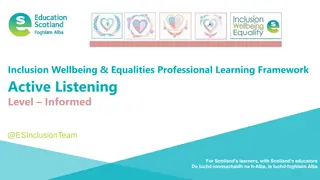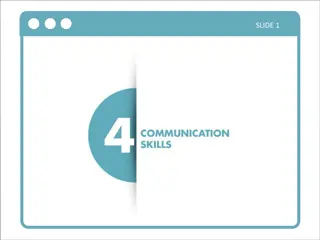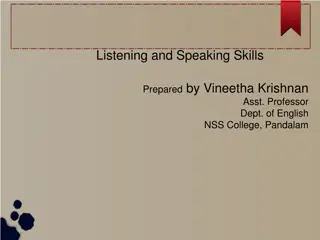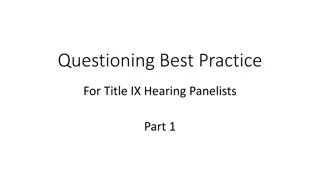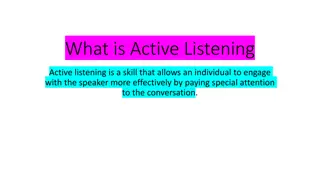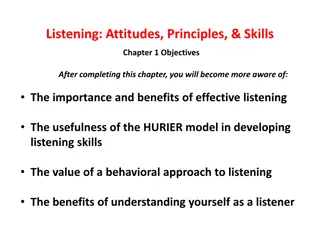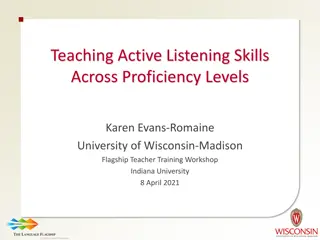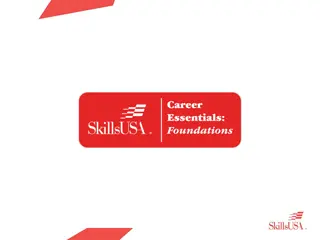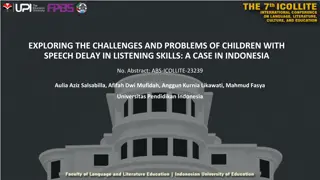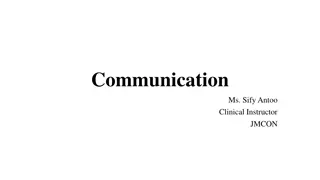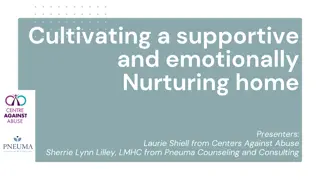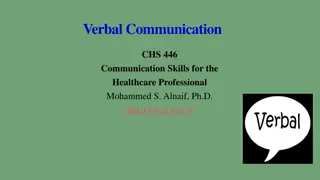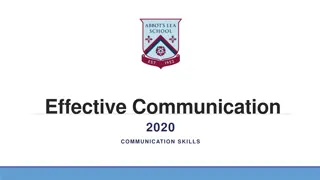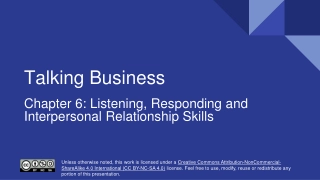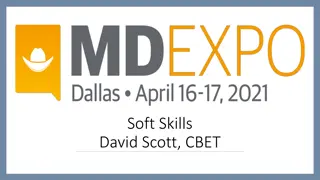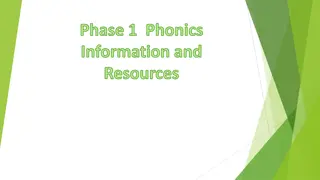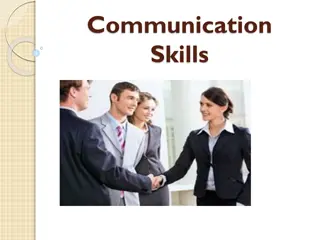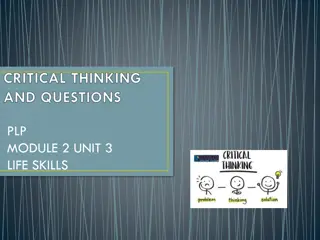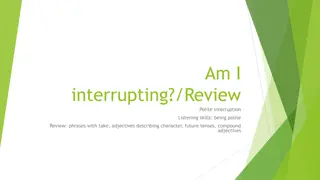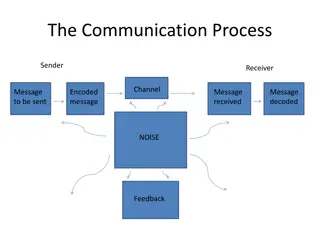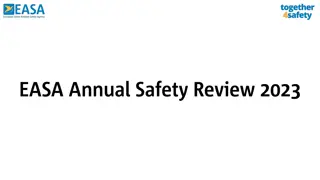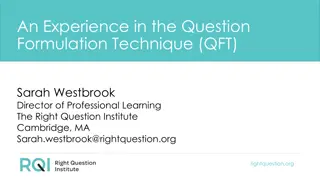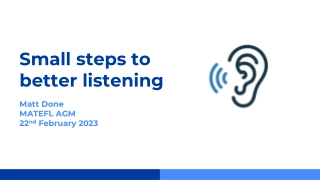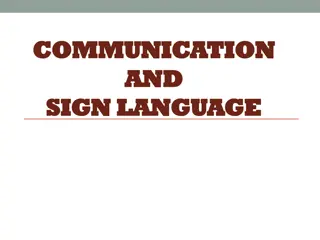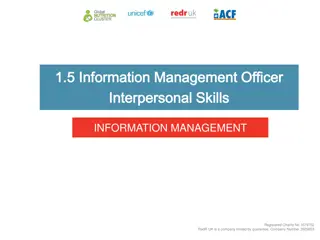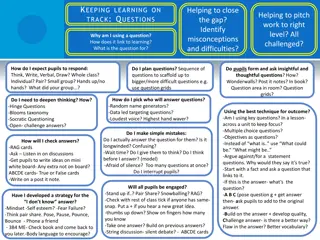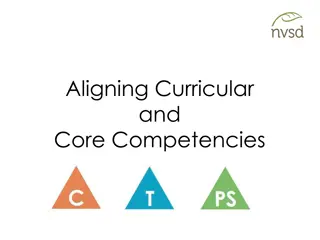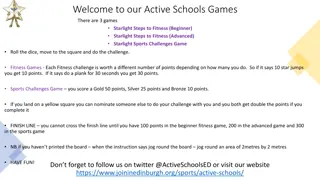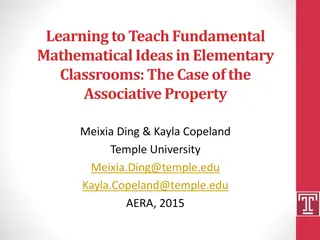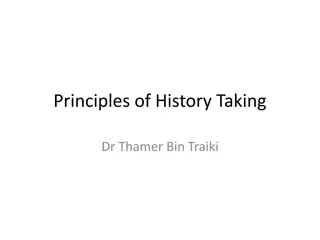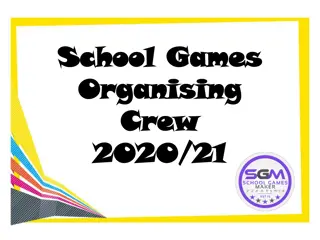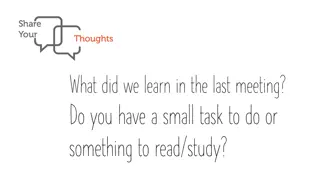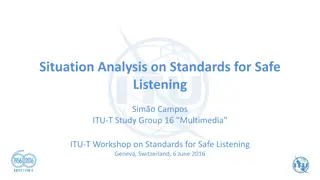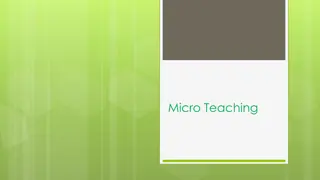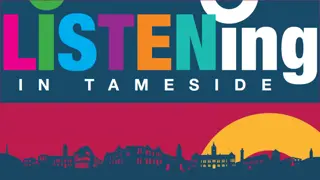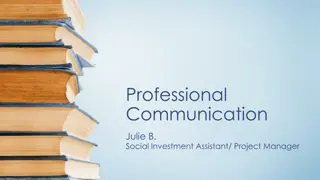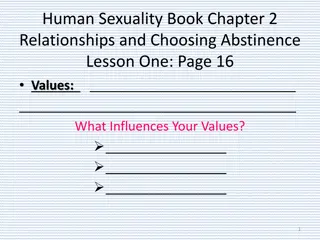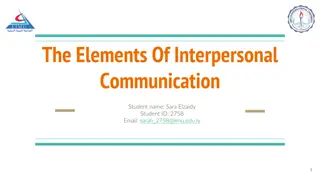Enhancing Communication Skills Through Active Listening and Effective Questioning
Explore the importance of active listening and effective questioning in communication. Learn strategies to show you're listening, even virtually. Discover the benefits of an active listening mindset and how to overcome barriers to listening effectively in various environments.
- Communication skills
- Active listening
- Effective questioning
- Virtual communication
- Workplace productivity
Download Presentation

Please find below an Image/Link to download the presentation.
The content on the website is provided AS IS for your information and personal use only. It may not be sold, licensed, or shared on other websites without obtaining consent from the author. Download presentation by click this link. If you encounter any issues during the download, it is possible that the publisher has removed the file from their server.
E N D
Presentation Transcript
LMP Skills booster LMP Skills booster Active listening and effective questioning SEPT 2021
Your Facilitators Your Facilitators Visit LMPartnership.org 3
LMP Skills Reflective Questions LMP Skills Reflective Questions Chat activity
Chat Activity Chat Activity What are ways that you show someone that you are listening when you are in person?
Chat Activity Chat Activity How do you know someone is listening when you are speaking virtually without a camera?
Chat Activity Chat Activity What is an active listening mindset?
Chat Activity Chat Activity What are the benefits of having an active listening mindset?
Chat Activity Chat Activity What are some ways you can change your environment to help you be a better listener in the workplace or home office?
Chat Activity Chat Activity What is an example of an open-ended question you like to use?
Chat Activity Chat Activity Research shows that most of us speak at a rate of 125 words per minute, but we can understand up to 400 words per minute. What communication problems can happen because we think faster than someone can speak?
Chat Activity Chat Activity As a listener, what barriers have you experienced when you are trying to actively listen to someone?
Chat Activity Chat Activity As a listener, how can you mitigate listening barriers?
LMP Skills Small Group Activities LMP Skills Small Group Activities Breakout activities
Breakout Activity #1: Are you listening? Breakout Activity #1: Are you listening? Learner instructions This is a 10-minute active listening partner activity. One person will speak, while the other person uses their active listening skills. Then you will switch roles. 1. Review the Listening quotes and select one that most resonates with you: a) I remind myself every morning: Nothing I say this day will teach me anything. So, if I m going to learn, I must do it by listening. Larry King, TV host b) Listening...involves a certain surrender, a willingness to sit with what one does not already know...Listening requires us to stretch a little beyond what we know, expect or want. Diana Senechal, author c) To say that a person feels listened to means a lot more than just their ideas get heard. It's a sign of respect. It makes people feel valued. Deborah Tannen, author and professor of linguistics, Georgetown University d) Listening is a magnetic and strange thing, a creative force. The friends who listen to us are the ones we move toward. When we are listened to, it creates us, makes us unfold and expand. Karl A. Menniger, American psychiatrist
Breakout Activity #1: Are you listening? Breakout Activity #1: Are you listening? Learner instructions 2. Choose who will initially be the speaker and who will be the listener (3 minutes per turn). Speaker: Using the quote you selected, answer these two questions: Which quote resonated with you and why? How will you apply the quote s meaning in your work or personal life? Listener: Use your active listening skills while the other person talks. Verify understanding by reflecting back and asking open-ended questions as appropriate. 3. Switch roles and be prepared to share your thoughts about the experience with the group. You have 10 minutes to complete this breakout activity.
Breakout Activity #1: Are you listening? Breakout Activity #1: Are you listening? Debrief 1. What was your experience as the speaker? 2. What was your experience as the listener? 3. What did the other person do that made you feel heard? 4. What new skills did you learn from this experience that you ll apply in your personal and professional life?
Breakout Activity #2: What happened? Breakout Activity #2: What happened? Learner instructions: You ll each share a personal or professional experience and how you applied or could apply active listening and effective listening skills more effectively. 1. Select one of the following options: a) An example of a conversation that didn t go well and if you were to have a similar conversation today, what active listening or effective questioning skills would you apply now? b) An example of a conversation that went well and the reason you believe it went well based on the active listening and effective questioning skills you learned today. c) An example of a high-stakes conversation that you re going to have soon and one active listening or effective questioning skill you learned today that you can apply. 2. In a round robin format, share the answer to the option you selected (3 minutes each). You have 15 minutes to complete this breakout activity.
Breakout Activity #2: What happened? Breakout Activity #2: What happened? Debrief 1. What was the example you shared? 2. What active listening or effective questioning skills can you apply to improve future conversations?
Resources Resources Visit LMPartnership.org 20
Resources Resources Job aids Active Listening & Effective Questioning <add link> Courses Review the communication courses available on KP Learn Websites Equity, Inclusion, and Diversity (EID) site Visit LMPartnership.org 21
Thank you for joining us. Thank you for joining us. If you have any questions, please contact: <fill in appropriate name and email address>
Appendix Appendix Polling questions Visit LMPartnership.org 23
Poll Question Poll Question Finish this phrase: Active listening is more than just listening to the words. It s about sensing the person s emotions, noticing their body language and hearing the ___________. a) Hidden messages b) Complete message c) Message you want to hear
Poll Question Poll Question Open-ended questions cannot be answered with a yes or no. a) True b) False
Poll Question Poll Question When asking questions, it s best to use what kind of tone? Select all that apply. a) Distracted b) Inviting c) Argumentative d) Non-judgmental e) Sarcastic
Poll Question Poll Question When you re listening and asking relevant and thoughtful questions, people are more willing to share information and work with you to help find a solution. a) True b) False
Poll Question Poll Question If you respond to a person with verbal cues, such as yes or uh-huh, you are showing that you agree with the speaker. a) True b) False
Poll Question Poll Question We cause problems when we listen for: a) Pauses b) Errors c) Criticism d) All of the above
Poll Question Poll Question We move conversations forward when we listen with: (Select all that apply.) a) Curiosity b) Suspended judgment c) A commitment to understanding their perspective d) A desire to work with them to find a solution
Poll Question Poll Question By taking the time to use active listening and effective questioning skills, you can: (Select all that apply.) a) Uncover the unknown by encouraging people to share more details b) Move your personal agenda through faster c) Allow everyone the opportunity to share their opinion d) Come up with better solutions
Poll Question Poll Question Although all types of questions can be useful in a conversation, using open-ended questions helps encourage speakers to share more details, give their opinion, and think more deeply. a) True b) False
Poll Question Poll Question What is the value of reflecting back what you hear to the speaker? (Select all that apply.) a) Hearing your own voice b) Making sure that the other person feels heard c) Verifying your understanding of what the person is trying to communicate


